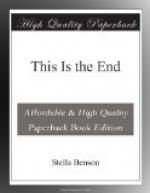He dismounted into a faint yellow fog diluted with a faint twilight, in the Brown Borough. The air was vague, making it not so much an impossibility to decipher the features of people approaching as a surprise to find it possible. A few rather premature bar row-flares adapted Scripture to modern conditions by hiding their light under tin substitutes for bushels, in the hope of protecting such valuables as cat’s meat and bananas from aerial outrage. Kew pranced over prostrate children, and curved about the pavement to avoid artificially vivacious passers-by, who emerged from the public-houses.
Nana lived in a little alley which was like a fiord of peace running in from the shrill storm of the Brown Borough. Here little cottages shrank together, passive resisters of the twentieth century. Low crooked windows blinked through a mask of dirty creepers. Each little front garden contained a shrub, and was guarded by a low railing, although there would have been no room for a trespasser in addition to the shrub. Nana’s house, at the end of the alley, looked along it to the far turmoil of the mother-street.
Kew insulted the gate, as usual, by stepping over it, and knocked at the door. He held his breath, so that he might more keenly hear the first whisperings of the floor upstairs, which would show that Nana was astir.
A gardenful of cats came and told him that his hopes were vain. Cats only exist, I think, for the chastening of man. They never come to me except to tell me the worst, and to crush me with quiet sarcasm should my optimism survive their warning.
But before the cats had finished speaking, there was a most un-Nana-like sound of bounding within, and Jay appeared. She threw herself out of the darkness of the door on to the twilit Kew.
The cats were ashamed to be seen watching this almost canine display, and went away.
“I didn’t know you weren’t in France,” said Jay to Kew.
“I didn’t know you weren’t in Heaven,” said Kew to Jay. “What’s all this about golden seas and aeroplanes snarling around?”
“Oh, snarling.... That’s just what they do,” said Jay. “Let’s pretend I said that.”
It seemed as if childhood turned its face to them again after a thousand years. These roaring months of War run like a sea between us and our peaceful beginnings, so that a catchword flashed across out of our past is as beautiful and as incredible as the light in a dream.
When they were little they used to bargain for expressive words. Their childhood was full of such hair-splittings as: “If you tell how we said Wank-wank to the milkman, you must let me have the old lady who had a palpitation and puffocated running after the ’bus.”
They were not spontaneous people. They were born with too great a love of words, a passion for drama at the expense of truth, and a habit of overweighting common life with romance. It was perhaps good for them to have acquired such a very simple relation by marriage as Anonyma.




